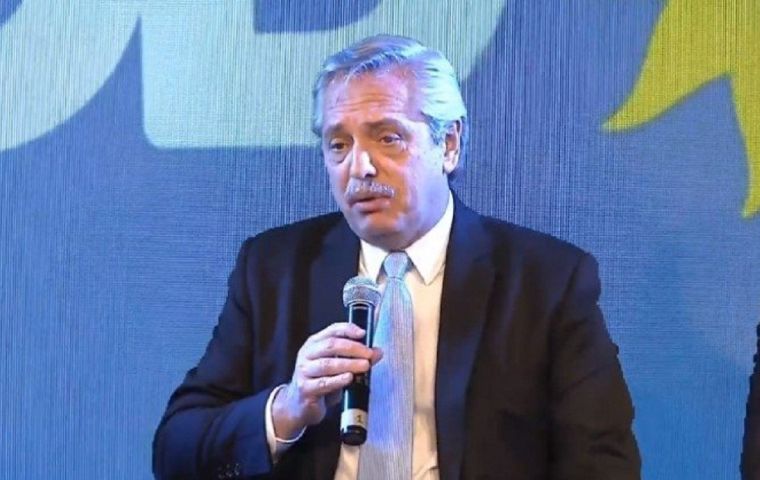MercoPress. South Atlantic News Agency
Argentine opposition presidential candidate reaches out to undecided voters
 “I am not dogmatic,” Alberto Fernandez said in a televised debate with Macri and several lesser-known candidates contesting the Oct. 27 election.
“I am not dogmatic,” Alberto Fernandez said in a televised debate with Macri and several lesser-known candidates contesting the Oct. 27 election. The front-runner in Argentina’s presidential election reached out to undecided voters on Sunday, promising both orthodox and unorthodox policies to cure the country’s deep economic troubles.
Populist-leaning Alberto Fernandez came out swinging against business-friendly incumbent Mauricio Macri, calling him responsible for the country’s recession. But eager to fight Macri’s effort at casting him as die-hard leftist who would isolate Argentina, Fernandez refused to be boxed in.
“I am not dogmatic,” he said in a televised debate with Macri and several lesser-known candidates contesting the Oct. 27 election.
“The solutions I offer will be both orthodox and heterodox. What you will never see are policies that go against those who produce and those who work for a living,” he said.
Grains producers in Argentina, one of the world’s key bread-baskets, have been strong Macri supporters. But Fernandez’s surprisingly comfortable win in the August primary all but ended Macri’s hopes of being re-elected.
“Fernandez is not playing populism here. He’s sounding more like a an angry technocrat, blaming Macri for everything,” said Julio Burdman of local political polling firm Observatorio Electoral.
“The probability of Fernandez not winning in the first round is very, very low. The economy has done nothing but get worse since the primary election, so it’s not likely that Macri is gaining much ground,” Burdman said.
To win in the Oct. 27 first-round, Fernandez must get at least 45% of the vote or 40% with a difference of 10 percentage points over his nearest rival.
Farmers and other business groups have voiced fear that a Fernandez presidency would send Argentina back to the days when ex-President Cristina Fernandez de Kirchner saddled the economy with heavy trade and currency controls that Macri quickly rolled back when he took office in late 2015.
Fernandez de Kirchner, who feuded with the farm sector during who two-terms in office and whose battles with bond-holders kept the country in default, is running as Fernandez’s vice presidential candidate. Facing several corruption charges stemming from her 2007-2015 presidency, all of which she denies, she has been largely absent from the campaign.
Macri won office on promises of using orthodox economics to attract the investment needed for sustainable economic growth.
But his fiscal push included highly unpopular cuts to public utility subsidies, which increased inflation by jacking up power and heating gas bills for businesses and families.




Top Comments
Disclaimer & comment rules-

-

-

Read all commentsEnrique,
Oct 16th, 2019 - 04:46 pm +1What is all this mixing Macri and Cristina nonsense?
The truth is that no politician wants to talk about the systemic failure of our country's administration.
The cost of our political system is outrageous. Macri didn't fix it and Alberto is going to worsen it. The guy wants to create 6 new ministries as if we didn't have enough of those things already.
If politicians didn't spend so much, we wouldn't need capital or exchange controls.
How are things going in Canada? Do you think that they would have reached such standard of living by imposing controls?
Check your numbers. Hope you understand why I support Espert.
That's right Kamerad/Komrade, and when the Fascist Peronists take over, it will descend at an accelerated rate. I'm looking forward to the entertaining news...
Oct 14th, 2019 - 11:00 pm 0https://img.photobucket.com/albums/b521/imoyaro/kkrique4_zpsv642e38g.jpg
Unfortunately, Enrique you do not realize that trade and currency controls are the recipe to ruin an economy.
Oct 15th, 2019 - 06:16 pm 0Those might work if your end model is Cuba.
Where do you get your data?
Our GDP has not grown in absolute terms since 2011.
@imoyaro That “K” bracelet is a great touch. It says it all.
Commenting for this story is now closed.
If you have a Facebook account, become a fan and comment on our Facebook Page!